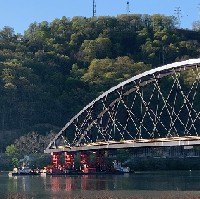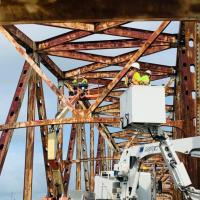Researchers at the University of Nebraska-Lincoln (UNL) and University of Nebraska at Omaha (UNO) will carry out the work on behalf of the Department of Defense Army Corps of Engineers.
Daniel Linzell, professor of civil and environmental engineering at UNL, and Robin Gandhi, professor of information science and technology and director of the School of Interdisciplinary Informatics at UNO, will lead the project, which is called ‘Multilevel analytics and data sharing for operations planning’.
“With the ability to electronically monitor the structural safety and stability of our infrastructure comes the responsibility to protect it from cyber security risks,” Gandhi said. “This research aims to add to a growing body of knowledge in both of these areas.”
Linzell added that, while bridges in the US have admirably served the travelling public for decades, they are at a point where advanced age, increased demand, extreme weather and finite resources necessitate modifications to how their health is assessed and how bridge systems are managed.
“Our team’s findings will augment current processes and allow for optimal allocation of labour and financial resources while, most importantly, maintaining safety,” he said. “New technologies will be robust enough to support management of other large, infrastructure systems and could provide unique economic development opportunities in Nebraska.”
Rural Nebraska bridges will be used as full-scale ‘testbeds’. Gandhi, Linzell and other Nebraska University researchers will work in collaboration with Kinnami Software to conduct research and development using sensors, unmanned aerial vehicles and more. The project also includes aspects such as data processing and management; visualisations and analysis of data using machine learning; and decision support systems.
Senator Deb Fischer was instrumental in advancing the project. “New monitoring technology has the potential to increase the safety of our nation’s bridges and make infrastructure repairs less costly,” she said. “Through this important research, Nebraska will lead the way in the development of these sensors to help address transportation challenges in the future.”
The team said that new systems would allow officials to more closely monitor the health and safety of bridges at a time when a recent analysis of US Department of Transportation data shows more than a third of US bridges are in disrepair.
While such systems would provide early detection of potential safety hazards, they could be vulnerable to cybersecurity threats. The research project will allow for predictions of remaining bridge life and guidance for maintenance using secure communications and protected data systems. It also will provide data for use by the Department of Defense as well as public and private stakeholders to better prioritise budgets, protect bridges and ensure the safety of those who travel on them.
Gandhi credited a large network of people and institutions who contributed to making the research effort possible, including Kinnami Software, which will be developing its resilient data platform, AmiShare, to protect and manage the sensitive data related to the project.





